-
-
-
USA
AE
AU
CA
DE
EU
JP
NZ
RU
SG
UK
- SHOP ALL
- SALE
- CASES
- DRY BAGS
- BACKPACKS
- DUFFELS
- COOLERS
- OB RANGES
- ACTIVITY
- ABOUT US
- WARRANTY
- SUPPORT
Paddleboarding is a pretty addictive water sport.
Sure, it’s not the easiest water sport to master, but that’s what makes it more of a thrill when you find yourself getting better at it. It also doesn’t hurt that it’s a really good workout. And if you put in the time, you’ll find yourself developing some serious SUP skills to be proud of.
If you find yourself really falling in love with paddleboarding, you may even be considering turning it into a career.
What could be more enjoyable than imparting your paddle boarding wisdom and skills on to others, and watching them learn and get better at your favourite water sport?
And the best part is, you get to spend all day frolicking in the great outdoors. On the waters. And getting paid for it.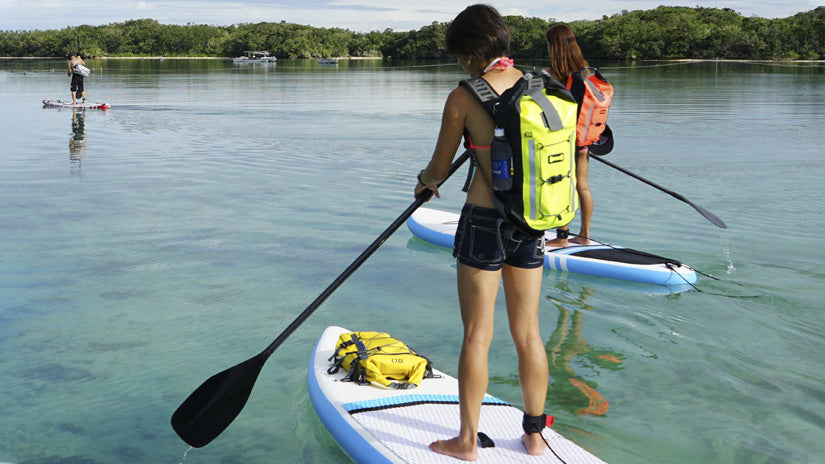
Now, we’re not saying it’s an easy feat. To become a paddle board instructor, you need the passion, the expertise, the right waterproof gear, and you need to book yourself and get certified through an official course. Even if you’re an expert paddle boarder, as with teaching any sport, you need a more structured approach to coach others, and you need to learn how to follow safety procedures.
It’s also required if you want to turn it into a career. All stand up paddle board instructor jobs will ask that you have an official certification showing that you know SUP skills and techniques, and also have the know-how to teach others at a high standard.
Read on to find out everything you need to know about how to become a paddleboard instructor in the UK, including details on the SUP courses and where to get SUP instructor training.
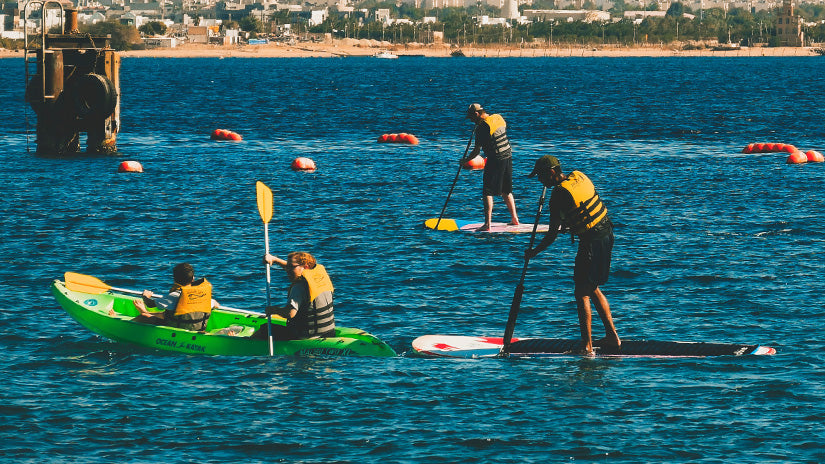
First things first, what stand up paddle board instructor certification do I need to get started?
Let’s kick off by looking at the specific SUP instructor qualifications you’ll need at the very start of your career.
The BSUPA (British Stand Up Paddle Association) is the UK’s governing body for stand up paddle boarding, and they’re the ones who offer a range of SUP courses and have the ability to certify you as an instructor. You’ll find that a BSUPA certified qualification is the basic requirement for pretty much any paddle board instructor job in the UK.
There are different levels of courses on offer, and you need to start with the first to progress through the instructor pathway. To become a paddle board instructor in the UK, you need to start with the BSUPA Level 1 Instructor - Ready to Ride course.
This is an intensive 2-day course where you’ll learn how to coach other students on basic paddle board skills and techniques. You’ll also be taught and assessed on your group control ability, level of SUP knowledge, and understanding of SUP safety. Once you qualify, you’ll be able to get pretty much any entry level SUP instructor job you want.
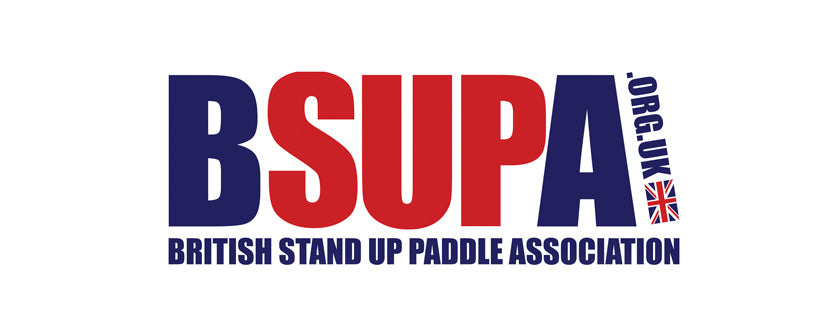
What are the steps I need to take to book myself onto the SUP instructor course?
If you’re ready to kick off the BSUPA Level 1 Instructor course, you must already have basic SUP knowledge. Ideally, you’d had a BSUPA Ready to Ride Card, which means you’ll know about safety and know how to do basic paddle boarding techniques and strokes.
Looking for a course close to you? You can find SUP instructor course dates near you on the BSUPA site.
A few important things to keep in mind before you get started with locating the closest course to you:
- The BSUPA Level 1 Instructor course is only open to those aged 18 and above and will cost £199 in total (including manuals and certificates).
- You need to become a member of the BSUPA before you begin, and you should also be qualified in First Aid.
- Ability-wise, you’ll be expected to be fully competent on a range of paddle boards. For instance, you should know (and more importantly, be able to demonstrate) short paddle strokes, reverse paddle boarding and push turns among other basic techniques.
- You’ll need at least 40 hours of SUP experience before you can begin the instructor course.
- Worried that you have zero watersports teaching experience? You can still do the course, but you’ll be required to shadow qualified BSUPA instructors before you can get officially certified yourself.
- Your BSUPA Level 1 certificate will remain valid for 3 years after your course date.
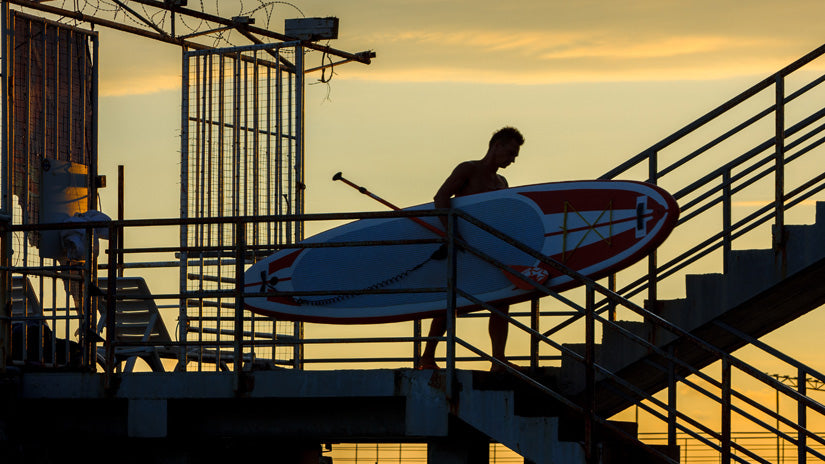
I’m already a qualified instructor for another water sport. Can I go ahead with teaching paddle boarding with the other speciality certification that I have?
If you’re already a qualified water sports instructor, you’ll still need to take a course that enables you to teach paddle boarding specifically. You can take the 1 day BSUPA conversion course for £145, which saves you time and money.
Since you’ve already taught water sports before, you won’t need to shadow teach which saves time. And you’ll also have a ton of transferable skills from your other instructing experience that you can bring to the role.
What does a SUP instructor course (level 1) involve?
The aim of the SUP course is to teach you how to plan and deliver your paddle board sessions safely and effectively for your students.
Across the 2 days, you’ll be taught how to coach students on paddle skills and general SUP knowledge. Some of your time will be spent in the classroom, but you’ll also spend time on the water so there’s a good mix of practical and theoretical learning.
The course covers detail such as how to assess sites, weathers, tides and techniques for rescue and teaching. It also goes over the best paddle board equipment and the right gear to use.
You’ll leave the 2-day course with a great amount SUP knowledge, enhanced paddle board techniques and strokes, and of course the all-important SUP certification you need to help you get your first instructor job!
How will I be assessed?
At the end of the course, there’ll be an exam and you’ll also be required to take a paddle test on the water. This way both your theoretical and practical knowledge of paddle boarding and technical teaching will be tested.
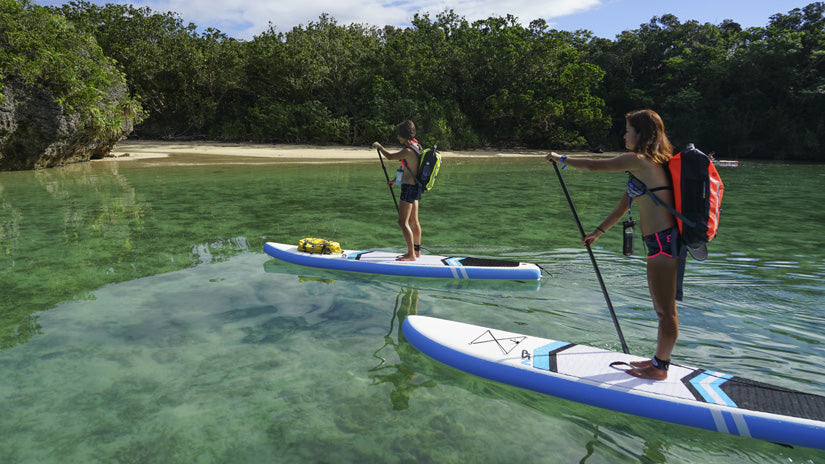
Where should I look for paddle board instructor jobs in the UK?
SUP instructor job opportunities are often posted up on the BSUPA site, and there are also various other online resources such as Summer Jobs Abroad and Best Adventure Jobs where you can look for entry level jobs. Temporary positions are posted up quite frequently, so keep an eye out close to peak season periods.
If you’re not having much luck finding anything online in your area, it’s worthy applying directly to your nearby water sports or outdoor activity centre. Since paddle board courses are quite seasonal, it’s worth building up a relationship with a specific centre so they immediately consider you when a vacancy comes up.
What comes next? What are all the different levels of a paddle board instructor’s career?
Though we’ve focussed only on the starting phase of how to become a paddle board instructor here, there are more steps up the ladder once you’ve perfected your Level 1 teaching and are ready to embark on coaching more advanced students and teaching other techniques.
The BSUPA instructor pathway is as follows:
BSUPA Level 1 Instructor
You have all the details on this one! With this certification, you can teach and issue BSUPA Ready to Ride Certificates and teach on flat water conditions between 30 - 50m from the shoreline.
BSUPA Level 2 Sup Tour/Race Instructor
You can teach and certify all the following BSUPA levels: Ready to Ride, Ready to Race, Ready to Tour, Born to Race/Tour and Guided Tour Experience. Again, water conditions should be flat and between 30 - 50m from the shoreline.
BSUPA level 2 Sup Surf Instructor
You can teach and certify Born to Surf and Ready to Surf in waist high soft surf conditions and between 30 - 50m from the shoreline
BSUPA Coach
You can teach and certify all-plus specialist coaching subjects. That includes fitness, race-surf, yoga, whitewater, paddle tech and wellbeing. 30-50m from the shoreline.
BSUPA Trainer
The highest level of BSUPA instructor course, where you can teach and officially certify instructors in level 1 or level 2 tour, and also surf.
Hopefully, you’re now a little clearer on the steps you need to take to turn your SUP instructor job dreams into reality and get started on your journey. If you meet the prerequisites and have the basic paddle board skills needed, it’s not a huge time and cost investment to get started. Once you’re professionally qualified and have the right paddle board equipment, you’re all set to begin a rewarding enjoyable SUP coaching career!














